 Petzlover
Petzlover Belgian Shepherd Dog (Malinois) is originated from Belgium but Mexican Hairless is originated from Mexico. Belgian Shepherd Dog (Malinois) may grow 8 cm / 4 inches higher than Mexican Hairless. Belgian Shepherd Dog (Malinois) may weigh 12 kg / 27 pounds more than Mexican Hairless. Belgian Shepherd Dog (Malinois) may live 6 years less than Mexican Hairless. Belgian Shepherd Dog (Malinois) may have more litter size than Mexican Hairless. Both Belgian Shepherd Dog (Malinois) and Mexican Hairless requires Low Maintenance.
Belgian Shepherd Dog (Malinois) is originated from Belgium but Mexican Hairless is originated from Mexico. Belgian Shepherd Dog (Malinois) may grow 8 cm / 4 inches higher than Mexican Hairless. Belgian Shepherd Dog (Malinois) may weigh 12 kg / 27 pounds more than Mexican Hairless. Belgian Shepherd Dog (Malinois) may live 6 years less than Mexican Hairless. Belgian Shepherd Dog (Malinois) may have more litter size than Mexican Hairless. Both Belgian Shepherd Dog (Malinois) and Mexican Hairless requires Low Maintenance.
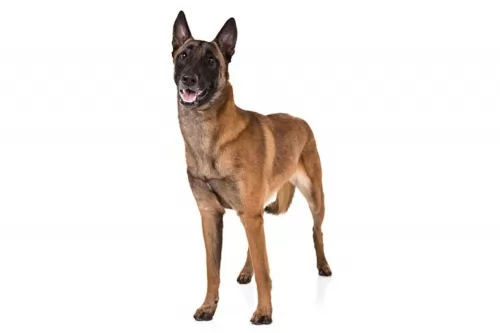 The Belgian Malinois is one of 4 Belgian Shepherd varieties. The dogs were developed- and hail from Belguim. The Malinois has a short, fawn colored coat. The American Kennel Club recognizes that the Malinois is a separate breed from the other 3 varieties. It was in 1892 that Professor Reul wrote the first Belgian Shepherd Dog standard, recognizing 3 varieties – dogs with short coats, dogs with long coats and dogs with rough coats.
The Belgian Malinois is one of 4 Belgian Shepherd varieties. The dogs were developed- and hail from Belguim. The Malinois has a short, fawn colored coat. The American Kennel Club recognizes that the Malinois is a separate breed from the other 3 varieties. It was in 1892 that Professor Reul wrote the first Belgian Shepherd Dog standard, recognizing 3 varieties – dogs with short coats, dogs with long coats and dogs with rough coats.
Today's Malinois goes back to a breeding pair owned by Adrien Janssens. It was in 1885 that he bought a fawn, rough-haired dog, breeding the dog with a short-haired dog named Lise de Laeken. After other breedings, the two dogs were recognized as ancestors of the modern Belgian Shepherd Dogs.
The city of Malines formed a club for the promotion of these fawn short hairs and the name Malinois became synonymous with them. In March 1992, the American Belgian Malinois Club received AKC parent club status.
 Who can believe that the origin of these dogs which hail from Mexico, goes back more than 3,500 years?
Who can believe that the origin of these dogs which hail from Mexico, goes back more than 3,500 years?
Known as the Xoloitzcuintli dog or Xolo for short, they comes in different sizes – toy-, miniature and standard which means there are different sizes. Both coated- and hairless dogs can be found in the same litter.
There was a time when the dog nearly became extinct buts its numbers have recovered. This is no doubt because there was a time when the natives ate the dog’s flesh.
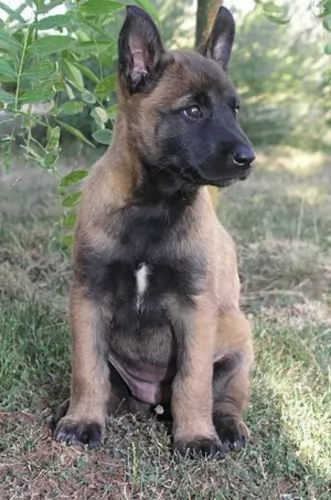 The Malinois is a medium-size Belgian shepherd dog. People sometimes mistake them for the German Shepherd as they are fairly similar to look at. The Malinois however is a smaller, lighter boned dog with naturally upright ears and a black-masked face. He is shorthaired and fawn-colored with black tips on the hairs, although other colors are brown or red too. He is an intelligent and active dog, always having been used for herding-, police- and rescue work.
The Malinois is a medium-size Belgian shepherd dog. People sometimes mistake them for the German Shepherd as they are fairly similar to look at. The Malinois however is a smaller, lighter boned dog with naturally upright ears and a black-masked face. He is shorthaired and fawn-colored with black tips on the hairs, although other colors are brown or red too. He is an intelligent and active dog, always having been used for herding-, police- and rescue work.
You’ll find the Malinois somewhat unpredictable as some are friendly and confident while other can be shy and withdrawn around strangers. This is a dog who loves to be around his human family, but to bring out the best in him, training and socialization classes will be necessary. Well-socialized Malinois are always good with children and other pets, more so if they’ve been raised with them.
 The Mexican Hairless is truly an ancient dog breed of the Americans. He stands at 35 – 58cm if he is the standard variety whereas the miniature will stand at up to 35cm. Weight can vary too, but with the standard variety, you're talking about 16 to 22kg.
The Mexican Hairless is truly an ancient dog breed of the Americans. He stands at 35 – 58cm if he is the standard variety whereas the miniature will stand at up to 35cm. Weight can vary too, but with the standard variety, you're talking about 16 to 22kg.
It has faced times of nearly being extinct but it’s numbers have recovered, and the dog is often sought after for those who suffer with dog-hair allergies. You could say that this dog’s most notable characteristic is its lack of hair and the soft skin.
Some of them have small tufts of hair on the hair, mostly around the top of the head. The skin can be various shades of gray to bronze and a yellowish color too. His body is slightly longer than its height and he is slim and well muscled. The tail is long and thin and is sometimes carried high. You can expect 2 – 5 puppies from these dogs.
Anyone acquiring a Xolo will discover that this is an intelligent dog breed and that just like with other dogs, you’ll be able to have him trained and socialized easily. Then he is obedient and a pleasure to have around.
He is active too and will require games with balls and ropes as well as a daily walk. The Xoloitzcuintli is noted for its calm demeanor. The puppies are a lot noisier than the adults and very energetic and this continues till they are about 2 years of age when they are considered to be adult.
Well raised Xolos form strong bonds with their human family, becoming loyal and devoted.
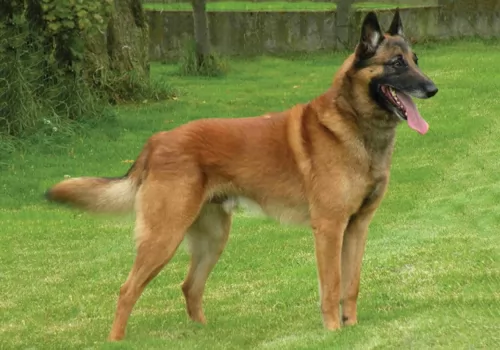 The Belgian Malinois makes a wonderful guard dog and he works hard to ensure that his human family, whom he adores, are well protected under his watch. They’re such intelligent dogs too that you may feel inclined to pass over some of your chores to him.
The Belgian Malinois makes a wonderful guard dog and he works hard to ensure that his human family, whom he adores, are well protected under his watch. They’re such intelligent dogs too that you may feel inclined to pass over some of your chores to him.
He responds well to training, and to get the best from this breed, start with training and socialization as soon as you bring your puppy home.
Socialization is excellent as it introduces your puppy to different people, animals as well as situations.
He is an adaptable dog and can live in an apartment if he is well exercised. He can be your devoted and loyal friend for a good number of years but you will have to do your part in providing him with the best care possible.
 The Xolo is one of those dogs who don’t get ill easily. He is also intelligent and fairly easy to train. Add to that the fact that he is also a low maintenance dog as he doesn’t have a coat that needs brushing and grooming.
The Xolo is one of those dogs who don’t get ill easily. He is also intelligent and fairly easy to train. Add to that the fact that he is also a low maintenance dog as he doesn’t have a coat that needs brushing and grooming.
Give your Xolo lots of attention because in exchange for the good care you give him, you’re going to get a loyal, devoted pet who loves to be with you constantly.
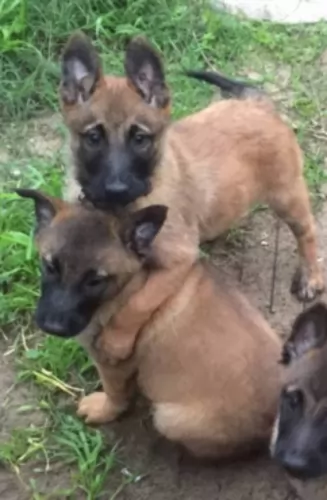 Belgian Malinois are generally healthy dogs. However every dog, regardless of breed, can pick up illnesses, and it is always wise to be aware of some of the diseases your Malinois might face.
Belgian Malinois are generally healthy dogs. However every dog, regardless of breed, can pick up illnesses, and it is always wise to be aware of some of the diseases your Malinois might face.
An inherited condition where the thigh bone doesn't fit properly into the hip joint. As the dog ages, arthritis can develop.
A degenerative eye disorder that can lead to blindness.
Brush his teeth at least 2 or 3 times a week to remove tartar build-up. Too much plague leads to inflamed gums, bad breath, pus inside the mouth and even loss of teeth.
 The Xoloitzcuintli is a hardy dog in terms of health and can live to a ripe old age in dog years – some have been known to reach 18, 19 and 20 years of age. Without a coat, this dog is susceptible to sunburn so care must be taken when outdoors.
The Xoloitzcuintli is a hardy dog in terms of health and can live to a ripe old age in dog years – some have been known to reach 18, 19 and 20 years of age. Without a coat, this dog is susceptible to sunburn so care must be taken when outdoors.
Hairless dogs tend to battle with skin problems such as pimples. Skin allergies can cause itching and scratching and these can lead to bacterial infections. It is interesting to note that the genes that bring about hairlessness also produce troublesome teeth, so that dental disease is quite rife with these dogs.
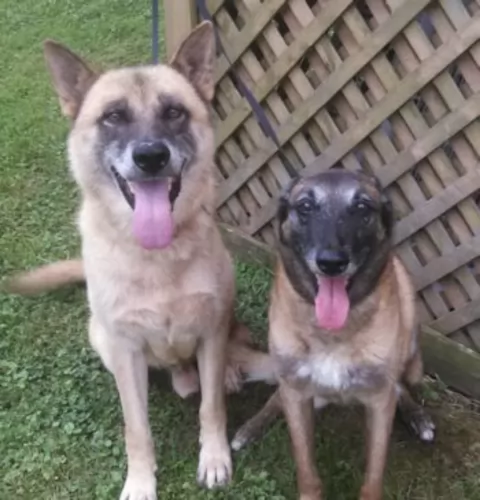 Because the Malinois is a constant shedder, with a couple of heavy shedding periods during the year, you’ll need to be conscientious with his grooming and brush him at least twice a week to get rid of loose hairs and to give his thick coat a glossy, healthy look to it.
Because the Malinois is a constant shedder, with a couple of heavy shedding periods during the year, you’ll need to be conscientious with his grooming and brush him at least twice a week to get rid of loose hairs and to give his thick coat a glossy, healthy look to it.
Because of their high energy, Malinois aren’t recommended for couch-potato type owners. It will be cruel to buy such a dog and to leave him to waste away with boredom and frustration in your back yard. He’ll want lots of rough and tumble, ball games, runs in the park or in the country and long walks.
Belgian Shepherd Malinois puppies are vulnerable when they’re tiny, and it would be wise to speak to your vet about superb nutrition to build up a puppy’s immune system.
An excellent way to ensure the health of your growing Malinois is to give him a home prepared meals along with commercially manufactured food recommended by your vet. You can’t just put a bowl of commercially manufactured dog food in front of him day after day month after month.
Apart from what your vet recommends, give him some brown rice, some cooked vegetables and some raw meat. Raw meat will ensure he can fight of skin infections. The age of the dog, emotional state and environmental influences can all play a role in skin diseases with dogs, but by ensuring some raw meat in his diet, the immune system is strengthened and skin disorders are eliminated. Always ensure a steady supply of fresh water.
 You’ve got to remember with this dog breed that he doesn’t have a coat so he can burn easily when out in the sun. If you know you’ll be in the sun for long, you’ll have to apply special sunscreen.
You’ve got to remember with this dog breed that he doesn’t have a coat so he can burn easily when out in the sun. If you know you’ll be in the sun for long, you’ll have to apply special sunscreen.
You can wipe down your Xolo or bath him from time to time, though not to often so as to strip the natural oils from the dog’s body. The nails will need to be trimmed regularly, as long nails can be a danger as they can hook on things and cause pain and bleeding.
Provide your hairless pet with a nice, soft bed to lie on.
Take him to the vet when he appears to be ill and see that you get his vaccinations done to prevent deadly illnesses such as rabies and parvo.
Check his eyes and ears for infections.
Brush his teeth to remove plaque. Never use human toothpaste. Take a look at the different canine toothpastes available.
Never leave your pet in a hot car with no windows open.
Provide your Xoloitzcuintli dog with high quality dog food so as to enhance health and longevity. Keep food simple for your pet to avoid digestive problems. Boiled chicken, brown rice or pasta and cooked potato, carrots and spinach can be chopped up and added to his dry kibble from time to time. Also a little bit of raw meat added in occasionally can also be excellent. Avoid feeding your pet foods such as onions, avocados, nuts, chocolate, coffee and raisins.
Make sure this dog has access to cool, fresh water night and day.